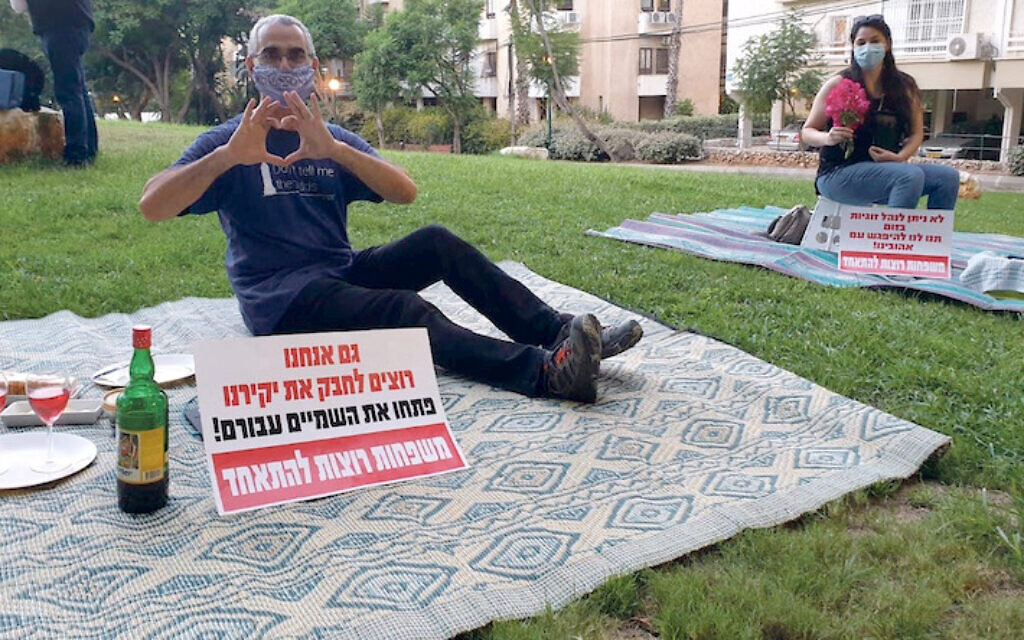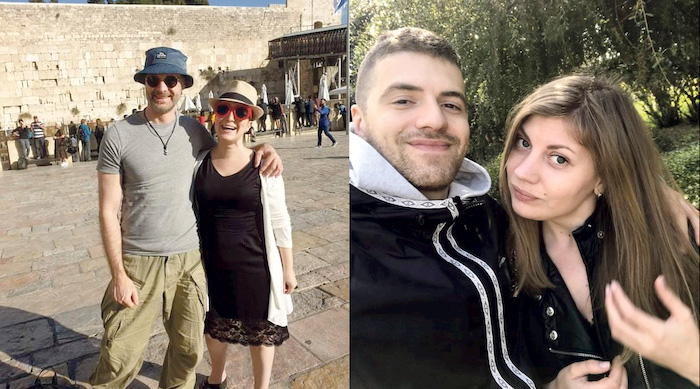‘I’m seeing my son grow up on videochat’
Coronavirus is separating Israelis from partners and children

It’s four months since Yaara Mizrachi saw her one-year-old son. She and her partner have been together for seven years, but because same-sex marriage is illegal in Israel, they never made their committed relationship official. Her partner, who does not wish to be named, lived in Berlin, Mizrachi lived near the port city of Haifa, and they would visit each other often.
At the end of 2017, they decided to have a child and build a life in the same place. Once the baby was born, they planned to spend six months in Germany and six months in Israel, then decide where to live. It was during the stint in Israel that the coronavirus spread across the globe.
On 13 March, Mizrachi’s partner flew back to Berlin to be near her ageing parents. Because she was the one who gave birth to their son, and he thus did not have Israeli citizenship, she took the baby along. Five days later, Israel shut its borders to foreigners. Because Mizrachi and her partner weren’t legally married, there has been no way for them to reunite as a family. So, since March, Mizrachi has watched her son grow up via videochat, 2,400 miles away.
Get The Jewish News Daily Edition by email and never miss our top stories Free Sign Up
“I always ask, does he remember me? Does he recognise me?” Mizrachi said. “We were co-parents and now it’s a situation where she’s raising him alone, and my ability to make decisions is minimised. So my parenting has been minimised to watching him develop and crawl and start to walk and grow teeth and wave goodbye. It’s something that I’m not connected to. It breaks my heart.”
Family separations like Mizrachi’s have become another effect of the pandemic in Israel, where the country’s Orthodox Chief Rabbinate controls all legal Jewish marriage. That means all recognised marriages need to take place under Orthodox rules, which forbid interfaith and same-sex marriage. So increasing numbers of secular, LGBTQ and interfaith couples marry elsewhere and then, eventually, file the paperwork necessary to certify the marriage in Israel. Others, like Mizrachi and her partner, don’t get married at all.
Activists have lobbied against Israel’s marriage laws for years, but couples have found workarounds and taken their time with the bureaucracy. The ease of travel between Europe and Israel also meant that couples who lived in both places could come and go as they pleased. That all ended on 18 March, when Israel shut its borders. Now, couples who hadn’t done the right paperwork – even those who are legally married somewhere else – find themselves in two different countries with no way to reunite.
“It’s really a scandal,” said Gabi Lasky, an Israeli human rights lawyer who is preparing to file a suit in the coming days on behalf of the separated families in Israel’s Supreme Court. “We have the right to family, the right to not be discriminated against. This is a disproportionate response that’s without basis and not topical, because there’s no legal reasoning that justifies discriminating against unmarried or same-sex couples.”
In one instance, a three-year-old Israeli girl was taken with her Ukrainian grandmother for a short visit to Ukraine — and then prohibited from returning to Israel for six months because, at first, there weren’t flights, and then because her grandmother wasn’t an Israeli citizen and was thus prohibited from boarding a plane for Israel. Eventually, the girl got home with the help of a special escort.
In June, Israel released guidelines paving the way towards family reunification — for people with recognised marriages in Israel. In July, it updated those guidelines to include married couples where one of the spouses is not an Israeli citizen, but those guidelines still mandate that the non-Israeli needed to have been in Israel for at least 90 days in 2019.
On Tuesday, updated guidelines said foreigners who had submitted an application to register their relationship in Israel could enter the country, pending approval of the Interior Ministry. For Israelis like Mizrachi, whose relationships aren’t officially recognised in any way, it doesn’t help at all.
The guidelines also let a variety of other foreigners into the country, including medical tourists, grandparents of people getting married, people studying in Israeli religious academies and more.
Sabine Haddad, a spokesperson for Israel’s Population and Immigration Authority, a division of the Interior Ministry, said that couples protesting against Israel’s guidelines are only those who have no actual proof that they’re together. “The Population Authority gives permits to hundreds of couples to enter,” she wrote in response to a JTA inquiry. “You’re talking about couples where no one knows they’re a couple except them and the press. Because according to the current rules, every registered couple receives a permit.”
But even married couples who have tried to register their marriages in Israel have found themselves stymied. Andrey and Polinka Belikov got married in Cyprus in October because Polinka is not Jewish, making it impossible for them to get married by Israel’s Chief Rabbinate.
Andrey is an Israeli citizen and Polinka is not. In January, she was in Ukraine and preparing to move to Israel. In January, Andrey went there to gather documents needed to register their marriage in Israel. In February, Polinka received a visa to live in Israel. She bought a plane ticket for 21 March, after which they planned to register the marriage.

On 17 March, she quit her job in anticipation of the move. The next day, Israel closed its borders. The Belikovs are hopeful that a change in the regulations will allow Polinka to enter the country.
“It’s really hard, every day, to just see your wife on a phone screen,” Andrey said. “We just got married and wanted to build a new family. But instead of that, in the hardest era for humanity, we’ve been prohibited from seeing each other.”
If Israel doesn’t change its rules soon, couples who are able may choose to make their lives elsewhere, Kettner said. Mizrachi is trying to see whether she and her partner can meet up in London and get to Berlin from there. Belikov may move to Ukraine, but that would mean giving up work as a house painter in Israel.
“Sometimes people approach this as, ‘Oh, all it is is that he can’t see his boyfriend,’” Kettner said. “But to not see the person who is your support system — that has health implications. They’re trying to protect us from the coronavirus, but they’re giving us other illnesses.”

Thank you for helping to make Jewish News the leading source of news and opinion for the UK Jewish community. Today we're asking for your invaluable help to continue putting our community first in everything we do.
For as little as £5 a month you can help sustain the vital work we do in celebrating and standing up for Jewish life in Britain.
Jewish News holds our community together and keeps us connected. Like a synagogue, it’s where people turn to feel part of something bigger. It also proudly shows the rest of Britain the vibrancy and rich culture of modern Jewish life.
You can make a quick and easy one-off or monthly contribution of £5, £10, £20 or any other sum you’re comfortable with.
100% of your donation will help us continue celebrating our community, in all its dynamic diversity...
Engaging
Being a community platform means so much more than producing a newspaper and website. One of our proudest roles is media partnering with our invaluable charities to amplify the outstanding work they do to help us all.
Celebrating
There’s no shortage of oys in the world but Jewish News takes every opportunity to celebrate the joys too, through projects like Night of Heroes, 40 Under 40 and other compelling countdowns that make the community kvell with pride.
Pioneering
In the first collaboration between media outlets from different faiths, Jewish News worked with British Muslim TV and Church Times to produce a list of young activists leading the way on interfaith understanding.
Campaigning
Royal Mail issued a stamp honouring Holocaust hero Sir Nicholas Winton after a Jewish News campaign attracted more than 100,000 backers. Jewish Newsalso produces special editions of the paper highlighting pressing issues including mental health and Holocaust remembrance.
Easy access
In an age when news is readily accessible, Jewish News provides high-quality content free online and offline, removing any financial barriers to connecting people.
Voice of our community to wider society
The Jewish News team regularly appears on TV, radio and on the pages of the national press to comment on stories about the Jewish community. Easy access to the paper on the streets of London also means Jewish News provides an invaluable window into the community for the country at large.
We hope you agree all this is worth preserving.
-
By Brigit Grant
-
By Laurent Vaughan - Senior Associate (Bishop & Sewell Solicitors)
-
By Laurent Vaughan - Senior Associate (Bishop & Sewell Solicitors)
-
By Laurent Vaughan - Senior Associate (Bishop & Sewell Solicitors)
-
By Laurent Vaughan - Senior Associate (Bishop & Sewell Solicitors)






















